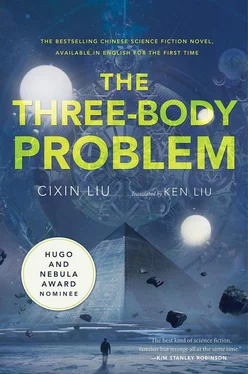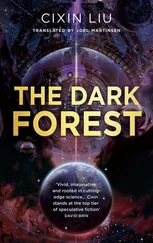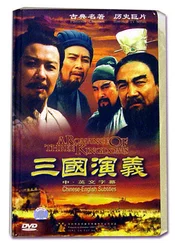The attempt to adjust his state of mind worked. By the time the log-in screen appeared, Wang seemed like a different person, one filled with an unexplainable excitement. Unlike the first two times, this time Wang came with a purpose: He was going to reveal the secret of the world of Three Body .
He created a new log-in ID appropriate for his new role: Copernicus.
* * *
Once logged in, Wang again stood on that broad, desolate plain, facing the strange dawn of the world of Three Body . A colossal pyramid appeared in the east, but right away Wang knew it was no longer the pyramid of King Zhou of Shang or Mozi. It had a Gothic-style apex, stabbing straight into the morning sky, recalling St. Joseph’s Church at Wangfujing. But if that church were placed next to this pyramid, it would be nothing more than an entrance booth. He saw many buildings in the distance that were apparently dehydratories, but also now built in the Gothic style, with tall, sharp steeples, as though the ground had grown numerous spikes.
Wang saw a door on the side of the pyramid, lit from within by flickering lights. He walked over. Inside the tunnel was a row of statues of the gods of Olympus holding up torches, their surfaces blackened by smoke. He entered the Great Hall and saw that it was even dimmer than the entrance tunnel. Two silver candelabra on top of a long marble table provided a drowsy light.
Several men were seated around the table. The dim light allowed Wang to see only the outlines of their faces. Their eyes were hidden in the shadows of their deep eye sockets, but Wang could still feel their gazes focusing on him. The men seemed to be dressed in medieval robes. On closer examination, one or two of them had simpler robes, more like Classical Greek chitons. At one end of the table was a thin, tall man. The golden crown on top of his head was the only thing that glittered in the Great Hall other than the candles. With some effort, Wang saw by the dim candlelight that his robe was different from the others’: it was red.
Wang realized that the game displayed a distinct world for each player. This world, based on the European High Middle Ages, was chosen by the software based on his ID.
“You’re late. The meeting has been going on for a while,” the gold-crowned, red-robed man said. “I’m Pope Gregory.”
Wang tried to recall what little he knew of European history in the Middle Ages so that he could deduce the level of advancement of this civilization based on the name. But then he remembered how wildly anachronistic historical references could be in the world of Three Body and decided the effort wasn’t worth it.
“I’m Aristotle. You changed your ID, but we all recognize you. In the previous two civilizations, you traveled to the East.” The speaker was the man with the Greek chiton. He had a head of white curls.
“Yes.” Wang nodded. “There, I witnessed the destruction of two civilizations, one by extreme cold, another by a blazing sun. I also saw the great efforts the scholars of the East expended in trying to master the laws governing the sun’s motion.”
“Ha!” The sound came from a man with a goatee that curled upward. He was even thinner than the pope. “Eastern scholars tried to understand the secrets of the sun’s motion through meditation, epiphany, or even dreams. Utterly laughable!”
“This is Galileo,” said Aristotle. “He advocates understanding the world through observation and experiment. He is an unimaginative thinker, but his results demand our attention.”
“Mozi also conducted experiments and observation,” Wang said.
Galileo snorted. “Mozi’s way of thinking was still Eastern. He was nothing more than a mystic dressed as a scientist. He never took his own observation data seriously, and he constructed his model based on subjective speculation. Ridiculous! I feel sorry for his refined equipment. We’re different. Based on large amounts of observational data and experiments, we make strict, logical deductions to build a model of the universe. Then we go back to experimentation and observation to test it.”
“That’s correct.” Wang nodded. “That’s also my way of thinking.”
“Have you brought a calendar as well, then?” The pope’s tone was mocking.
“I don’t have a calendar. I only brought a model built upon observation data. But I must make it clear that even if the model is correct, it’s not certain that by using it one can master the precise details of the sun’s motion and create a calendar. However, it’s a necessary step.”
A few lonely claps echoed throughout the Great Hall. The applause came from Galileo. “Excellent, Copernicus, excellent. Your pragmatic way of thinking, adapted to the experimental, scientific approach, is lacking in most scholars. Based on this alone, your theory is worth listening to.”
The pope nodded at Wang. “Go ahead.”
After calming himself and walking to the other end of the long table, Wang said, “It’s actually pretty simple. The reason why the sun’s motion seems patternless is because our world has three suns. Under the influence of their mutually perturbing gravitational attraction, their movements are unpredictable—the three-body problem. When our planet revolves around one of the suns in a stable orbit, that’s a Stable Era. When one or more of the other suns move within a certain distance, their gravitational pull will snatch the planet away from the sun it’s orbiting, causing it to wander unstably through the gravitational fields of the three suns. That’s a Chaotic Era. After an uncertain amount of time, our planet is once again pulled into a temporary orbit and another Stable Era begins. This is a football game at the scale of the universe. The players are the three suns, and our planet is the football.”
A few hollow laughs rang out in the Great Hall. “Burn him to death,” the pope said impassively. The two soldiers standing at the door in rusty armor started toward Wang like two clumsy robots.
“Burn him.” Galileo sighed. “I had hopes for you, but you’re nothing more than another mystic or warlock.”
“Such men are a public nuisance,” Aristotle agreed.
“At least let me finish!” Wang shoved away the iron gauntlets of the two soldiers.
“Have you seen three suns? Or know anyone who has?” Galileo asked.
“Everyone has seen them.”
“Then, other than the sun that appears during Chaotic Eras and Stable Eras, where are the other two?”
“The sun that we see at different times may not be the same: It’s only one of the three suns. When the other two are far away, they look like flying stars.”
“You lack basic scientific training,” Galileo said, shaking his head. “The sun must move continuously to a distant spot. It cannot jump over the intervening space. According to your hypothesis, there should be another observable situation: The sun must get smaller than it usually appears but bigger than a flying star, and gradually shrink into a flying star as it moves farther away. But we’ve never seen the sun behave that way.”
“Since you have scientific training, you ought to have some knowledge of the sun’s structure.”
“That’s my proudest discovery. The sun is made of a sparse but expansive gaseous outer layer and a dense and hot inner core.”
“Very true,” said Wang. “But you apparently haven’t discovered the special optical interaction between the sun’s gaseous outer layer and our planet’s atmosphere. It’s a phenomenon akin to polarization or destructive interference. As a result, when we view the sun from within our atmosphere and it gets a certain distance from us, the gaseous outer layer suddenly becomes completely transparent and invisible, and all we can see is its bright inner core. The sun then appears to be only the size of the inner core, a flying star.
Читать дальше












